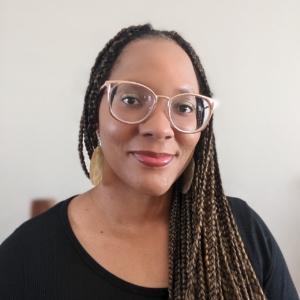
Welcome to our June issue, and farewell to a beloved editor

The summer of 2022 is roiling with challenges.
By the time you are reading this, or soon thereafter, Roe v. Wade is likely to have been overturned by the U.S. Supreme Court, and “states’ rights” will quash human rights. People around the globe will suffer from increasingly extreme temperatures, weather events, and food and water shortages. In the United States, there will be a damnable number of new mass shootings. Ukraine will be ever more battered by Putin’s violent imperialism. And many folks will flirt with despair.
Yet, despite the struggle, we are not without hope. Remember why we launched Writers Resist in the dark days after Trump’s election? To resist oppression, to share our fears and hopes with a kindred community. And we have.
To borrow a Nina Simone quote in the following essay by our beloved editor DW McKinney, “An artist’s duty, as far as I’m concerned, is to reflect the times.”
At Writers Resist, we’ve not only reflected the times, but shared visions of a more equitable future. And so we continue.
While DW’s message is one of farewell, and we will sorely miss her, she is moving on to important places where she will continue to make positive change in a challenging world—while Writers Resist continues to benefit from the enlightenment she brought to our process.
So we say goodbye to DW and welcome the opportunity to continue resisting creatively.
In the meantime, we are searching for another volunteer editor willing and able to donate some time for the love of words.
Are you interested? Contact K-B, our publisher: kbgressitt@gmail.com.
BTW: Join us for an online reading of this issue’s contributing writers on Saturday 23 July at 4:00 p.m. PACIFIC. Email K-B for the Zoom link at kbgressitt@gmail.com.
From DW McKinney

My maternal grandfather would play Nina Simone’s records in his den on rare evenings when the air was too warm and thick. He’d leave the doors leading to the outside patios open and we’d sit still, staring into the night as we drank in her voice. Even as a child then, I could feel the weight of her lyrics pressing heavily on us. It was probably a mercy that I didn’t hear her sing “Mississippi Goddam” until I was an adult.
In the summer of 2015, on a day that was similarly too hot to be outside and the air too thick to breathe comfortably, I took a lunch break from my job as a proofreader for the Texas Legislative Council and wandered into the Blanton Museum of Art. The oppressive heat from outside had worn me down so that by the time I entered the museum, my defenses were gone and I was raw and vulnerable to the emotional weight of the main exhibit.
The Blanton was hosting Witness: Art and Civil Rights in the Sixties, an exhibit that showcased paintings, sculptures, photography, and other media and art forms created in response to the 1960s’ political and social climate. A handful of visitors and I stood in a large egg-shell white room, the whole of it swallowing us and forcing us to seek refuge in the paintings hanging on the walls. I was gazing at Barkley L. Hendricks’s “Lawdy Mama” (1969) as I let the air conditioning soothe me. In the portrait, a young Black woman with an afro held her arm as she stood against a gold leaf backdrop with an arched top. The woman’s expression shifted from resignation to acceptance to neutral the longer I stared. It was that intense focus that emptied me of every distraction and allowed me to hear the musical notes tugging on my ear.
I followed the notes into an alcove where no one else had entered. A lone bench sat in the room. A film played on the white screen tacked to the wall in front of the bench. Nine Simone sat at a piano and vigorously played its keys. Every part of me stilled, and I was transported back into the sepia tones of my grandfather’s den. When the song was over, I waited for the reel to replay so I could watch the film from the beginning. I listened again and again, sitting there for who knows how long, aware that I had not eaten. Aware that my break was crawling to its last minutes. Aware that the white museum patrons took one look at the screen before moving quickly away into the next room. Aware that it was just Nina and I for quite a long time, just the two of us ruminating on freedom, Black bodies being beaten, and Black churches burning.
“Mississippi Goddam” rolled in my head all the way back to work and for a long time afterward. I couldn’t shake Nina Simone’s righteous anger or the ugly truths in the lyrics. Over my lifetime, I’ve listened to hundreds of political songs in rap, hip-hop, trip hop, electronica, Latin pop, and rock. But “Mississippi Goddam” was the first time that I felt a song’s claws rip into me and never let go. The sting of it never faded. I have been chasing that feeling since that afternoon in the museum.
That same summer, the documentary What Happened, Miss Simone? was released. The film featured archival interview footage of Nina Simone saying, “An artist’s duty, as far as I’m concerned, is to reflect the times.” Creatives evoked that quote ad nauseam in the days following the 2016 U.S. presidential election. I think writers and artists struggled to translate their thoughts and emotions following the election. So many of us wanted to defensively weaponize the lamentations we let loose into the new void we found ourselves in. Nina Simone became a filter for us to shape our weapons.
In the years since then, I became more closely drawn to creative works that delved into the visceral and heartbreaking but truthful variations of our lives. When I joined Writers Resist in June 2021, I looked forward to learning more about how our words create change. How our words become protestations that spur action. How we can shape a resistance on paper and through electronic waves. I was also hoping to become educated through the WR readership on how to improve my own literary activism. I am grateful to say that in my short tenure as an editor, I have done just that.
As I move on from my editorship this June, I leave with many lessons about voice, poetic form, second chances, and grace. I am thankful for the opportunities to read political commentary from writers all over the globe. I am especially thankful that our contributors have nurtured my curiosity about resistance in the literary arts.
If you’re curious about where I’m going from here, I will be expanding my current editorial role at Shenandoah and beginning a new position as a reviews editor for a small journal that debuts in 2023. But most immediately, this summer I will be leading the inaugural year of We Are The House: A Virtual Residency for Early-Career Writers through Raising Mothers. I’ve created this year-long residency to help parent-writers with almost no publications establish their nonfiction portfolio. It is the steppingstone toward my dream goal to establish a more dynamic, multi-genre residency for parent-writers.
As I leave, I can express nothing but gratitude to Writers Resist’s readership and to my generous colleagues on the masthead. I am never too far away.
Onward,
DWM
Photograph of the Sun by XoMEoX via a Creative Commons license.
Photograph of DW McKinney courtesy of the subject.
A note from Writers Resist:
Thank you for reading! If you appreciate creative resistance and would like to support it, you can make a small, medium or large donation to Writers Resist from our Give a Sawbuck page.
